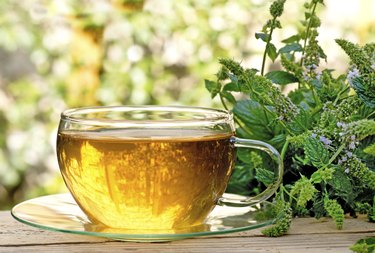
Herbal teas derive from plant materials, including leaves, stems, flowers, seeds, roots and fruits. Despite the name, herb teas aren't actually tea. Real tea, including black, oolong and green teas, comes from the leaves of the Camellia sinesis plant. Learning about common herbal teas and their properties will help you select a tea that meets your needs. Herbal teas are flavorful alternatives to caffeinated beverages.
Herbal Teas
Video of the Day
Some herbal teas have long histories of use for common maladies, such as the use of mint to soothe the stomach. Rose hip tea, made from the seedpods of roses, has a tangy flavor and provides vitamin C. Herbal teas may be made with a single herb, such as chamomile, or with a blend of herbs. Some tea blends that aren't truly herbal teas may contain ingredients that have caffeine. If you are sensitive to caffeine, you may experience nervousness and insomnia.
Video of the Day
Antioxidant Conten
Genuine herbal teas contain no caffeine. They do contain antioxidants, healthy compounds that scavenge free radicals, although most don't contain as much as true teas do. Herbal teas with the highest antioxidant properties include lemon balm, scarlet pimpernel and sweet basil, according to researchers from Turkey's Istanbul University, who reported their findings in the September 2006 "International Journal of Food Sciences and Nutrition." The March 2011 issue of "Chinese Medicine" lists oolong tea, arabian jasmine, guava, wolfberry, balsam pear and puerh as being high in antioxidant content also. Although not as high in antioxidant activity as the top herbs tested, blackberry, coltsfoot, coriander, immortelle, sage and thyme also have significant antioxidant capacity. Further research is needed on the health benefits of herbal teas.
Caffeine Content
An 8-ounce serving of brewed coffee contains 80 milligrams to 135 milligrams of caffeine, and a 2-ounce. serving of espresso contains 100 milligrams, the University of Utah reports. An 8-ounce serving of black tea contains 40 to 60 milligrams of caffeine, and an 8-ounce serving of green tea contains 15 milligrams. Read the label before buying a tea blend. Less common forms of tea, such as white tea and red tea, contain caffeine. Making your own herbal teas or blends from bulk herbs available at natural food stores allows you to customize a caffeine-free or low-caffeine beverage to suit your tastes.
Considerations and Warnings
Read product labels carefully. The name of a tea isn't enough to go by when you need to know caffeine content. For example, jasmine tea traditionally contains real tea in addition to jasmine. Tea called mate, made from certain types of holly, contain caffeine. Consult your doctor before consuming herbal teas or supplements. Some herbs can affect medications or have side effects.
- American Pregnancy Association: Drinking Herbal Teas During Pregnancy
- International Journal of Food Sciences and Nutrition: The Cupric Ion Reducing Antioxidant Capacity and Polyphenolic Content of Some Herbal Teas
- Chinese Medicine: Polyphenol Content and Antioxidant Effects in Herb Teas
- University of Utah: Caffeine Content of Popular Drinks